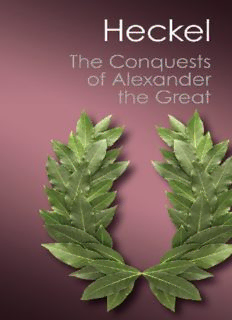
The Conquests of Alexander the Great PDF
Preview The Conquests of Alexander the Great
P1:KNP 9780521842471pre CUFX173/Heckel 9780521842471 September1,2007 12:31 vi P1:KNP 9780521842471pre CUFX173/Heckel 9780521842471 September1,2007 12:31 THE CONQUESTS OF ALEXANDER THE GREAT i i i Waldemar Heckel university of calgary iii CAMBRIDGE UNIVERSITY PRESS Cambridge, New York, Melbourne, Madrid, Cape Town, Singapore, São Paulo, Delhi, Mexico City Cambridge University Press 32Avenue of the Americas, New York, ny 10013-2473,usa www.cambridge.org Information on this title: www.cambridge.org/9780521842471 ©Cambridge University Press 2008 This publication is in copyright. Subject to statutory exception and to the provisions of relevant collective licensing agreements, no reproduction of any part may take place without the written permission of Cambridge University Press. First published 2008 First paperback edition 2010 Canto Classics edition 2012 Printed and bound by CPI Group (UK) L td, Croydon, c r0 4yy Acatalog record for this publication is available from the British Library. Library of Congress Cataloging in Publication Data Heckel, Waldemar, 1949– The conquests of Alexander the Great / Waldemar Heckel. p. cm. – (Key conflicts of classical antiquity) Includes bibliographical references and index. isbn 978-0-521-84247-1 (hardback) 1.Alexander,the Great, 356-323 B.C. 2.Greece – History–Macedonian Expansion, 359-323 B.C. I. Title. II. Series. df234.2.h37 2007 938'.07–dc22 2007025559 isbn 978-1-107-64539-4Paperback Cambridge University Press has no responsibility for the persistence or accuracy of urls for external or third-party Internet Web sites referred to in this publication and does not guarantee that any content on such Web sites is, or will remain, accurate or appropriate. P1:KNP 9780521842471pre CUFX173/Heckel 9780521842471 September1,2007 12:31 For Julia and Darren v P1:KNP 9780521842471pre CUFX173/Heckel 9780521842471 September1,2007 12:31 vi P1:KNP 9780521842471pre CUFX173/Heckel 9780521842471 September1,2007 12:31 CONTENTS i i i preface \ ix chronological table \ xv 1. Introduction 7 1 2. How Do We Know? Sources for Alexander the Great 7 5 3. The Macedonian Background 7 13 4. The Persian Enemy 7 31 5. Conquest of the Achaemenids 7 41 6. Resistance on Two Fronts 7 87 7. Conquest of the Punjab 7 112 8. The Ocean and the West 7 126 9. The Long Road from Susa to Babylon 7 142 \[ appendix 1: alexander’s officers \ 153 appendix 2: numbers of troops \ 158appendix 3: the administration of the empire \ 164 glossary \ 167 abbreviations \ 171 notes \ 173 bibliography \ 191 index \ 205 vii P1:KNP 9780521842471pre CUFX173/Heckel 9780521842471 September1,2007 12:31 viii P1:KNP 9780521842471pre CUFX173/Heckel 9780521842471 September1,2007 12:31 PREFACE i i i the aim of this book is to provide an intelligent introduc- tiontotheconquestsofAlexandertheGreat(334–323BC).Thisisnot a biography, and I have said little or nothing about Alexander’s youth, his sexual orientation, the breaking of Bucephalas, and the like. Nor do I go into detail concerning the nature of Alexander’s death. Some aspects of Alexander’s personality are discussed, since they pertain to ourunderstandingofhis“divinity”andhis“orientalism”;butevenhere the emphasis will be on the political impact of Alexander’s attitudes and personal actions. In short, this book was never intended to be an exhaustivetreatment.Althoughtheemphasisisonmilitaryandpoliti- cal (including administrative) aspects, the battle descriptions focus on keydevelopmentsratherthanprovidingblow-by-blowaccounts.More attention is given to aims and impact, to political consequences of militaryaction,andespeciallytotheuseofpropagandaforbothmoti- vation and justification. Conspiracies and mutinies are viewed within thecontextofthecampaign,asreactionstoAlexander’spoliciesandthe apparent changes in his personality, as symptoms of battle fatigue or disenchantmentwithcareerprogress.But,again,littlespaceisdevoted totheintricaciesoftheplotsortocloak-and-daggerscenes. WhileitisimportanttoconsiderAlexanderandhismilitaryachieve- mentinthecontextofhistimes,onemustalsorememberthatthebasic goals of conquest and keys to military superiority (once allowances have been made for technology) have not changed dramatically over the millennia. Indeed, Field Marshal Montgomery thought that even in the twentieth century the fundamental principles of war had not 1 changed since ancient times. Those who persist in seeing Alexander as a reincarnation of Achilles, as an irrational youth on a heroic quest forfameandimmortality,havebeentakeninbythemyth-makerswho shaped the Alexander legend, and they run the risk, in my opinion, of reducing one of the world’s greatest military strategists to a childish ix P1:KNP 9780521842471pre CUFX173/Heckel 9780521842471 September1,2007 12:31 x preface daydreamerandaspoiledbratunderthespellofsycophantsandhisown 2 delusions. This is reflected not only in the trendy subtitles of many books that are published today but in the na¨ıve approaches taken by those who sell Alexander as a cultural icon. Even children are courted withtitlessuchasAlexander:TheBoySoldierWhoConqueredtheWorld (bySimonAdams,forages9–12)orKidsWhoRuled:AlexandertheGreat (author’s name not given). Worst of all, too much biography and not enoughhistoryhasputthecartbeforethehorse.Nolongerdowejudge Alexander by his actions, policies, and historical achievement. Rather, we interpret his actions and his motives on the basis of preconceived notions about his psychological makeup and his social and sexual ori- entations. Too many of those who write about Alexander today claim toknowwhatAlexander“wouldhave”or“wouldnothavedone.”This is,infact,aprocessthathasbeenhandeddownforseveralgenerations. For example, C. L. Murison, in an article that actually attempts of vindicate the actions of Darius III, comments: “In general, we should remember that Alexander was an impulsive young man, whose dash andvigorfrequentlyledhimintotrouble:theideaofhimlurkingamid narrow places like some suicidal Quintus Fabius Maximus, is so unlike thecharacterwearefamiliarwith[myemphasis],thatwemustrejectit, 3 unless it is proved to the hilt.” I am entirely in sympathy with G. L. Cawkwell, who remarks that “those who tend to think that Alexander theGreatcouldmakenomistakesandthathisvictories...followedas 4 nightfollowsday...shouldbelefttotheirhero-worship.” Instead of accepting the arguments of Alexander’s own propagan- dists and later hagiographers, I have chosen to take a minimalist view, attemptingtounderstandtheroleofpropagandawithoutbeingduped byit.Themanwhoarrogantlydismissedthesuggestionofanightattack withthewords,“Ishallnotstealvictory,”hadnocompunctionsabout cheating when he cut through the Gordian knot with his sword; nor didhelosesleepoverthefactthathehadbrokenhiswordtotheIndian mercenaries, whom he slaughtered after promising them free passage; perhaps, despite official claims to the contrary, he had been intimate with Darius’ wife, a helpless captive. Hence, I make no apology for repeating my view on Alexander at the Hyphasis – which some have
